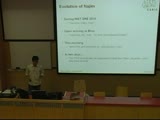Experiments in SVM-based Speaker Verification Using Short Utterances
SESSION 4: Speaker and language recognition – scoring, confidences and calibration
Added: 14. 7. 2010 11:08, Author: Mitchell McLaren, Robbie Vogt, Brendan Baker, Sridha Sridharan (Queensland University of Technology), Length: 0:29:17
This paper investigates the effects of limited speech data in the context of speaker verification using the Gaussian mixture model (GMM) mean supervector support vector machine (SVM) classifier. This classifier provides state-of-the-art performance when sufficient speech is available, however, its robustness to the effects of limited speech resources has not yet been ascertained. Verification performance is analysed with regards to the duration of impostor utterances used for background, score normalisation and session compensation training cohorts. Results highlight the importance of matching the speech duration of utterances in these cohorts to the expected evaluation conditions. Performance was shown to be particularly sensitive to the utterance duration of examples in the background dataset. It was also found that the nuisance attribute projection (NAP) approach to session compensation often degrades performance when both training and testing data are limited. An analysis of the session and speaker variability in the mean supervector space provides some insight into the cause of this phenomenon.
Lecture Information
| Number of views: | 1565 |
|---|---|
| Video resolution: | 720x576 px |
| Audio track: | MP3 [10.05 MB], 0:29:17 |




Comments